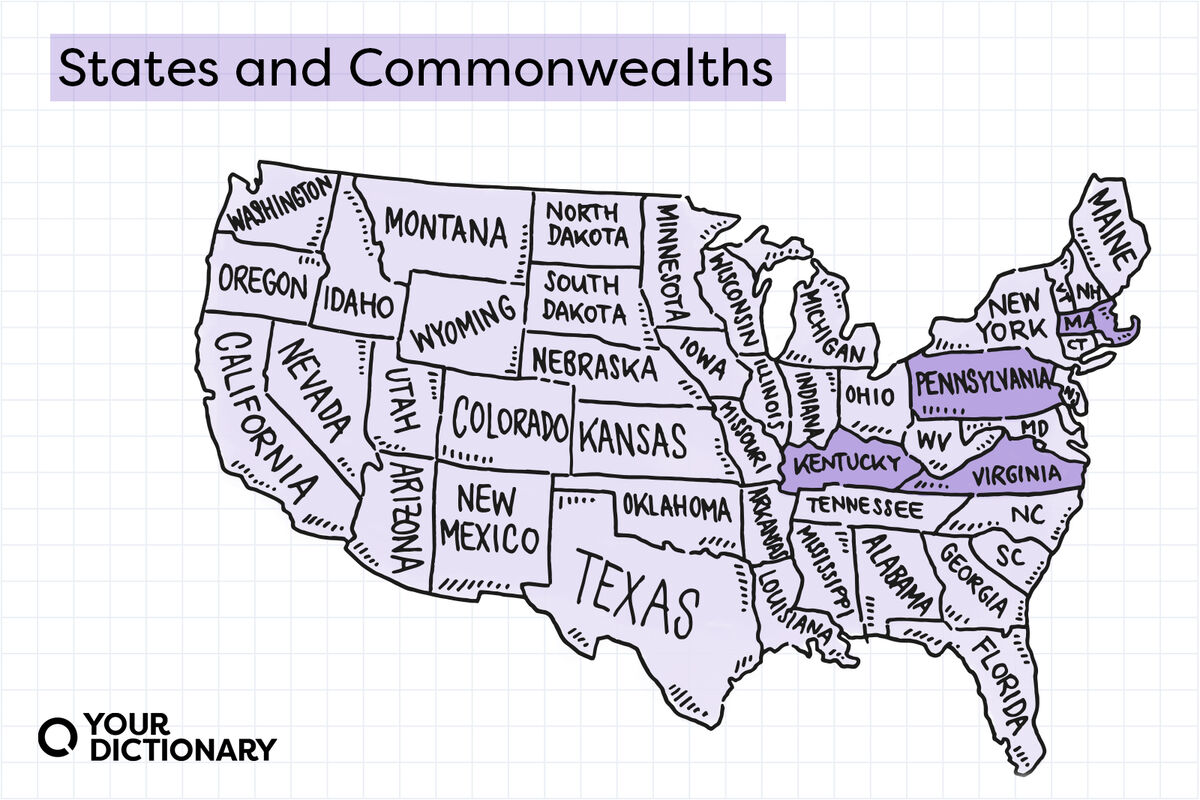
Pennsylvania, Belize, Australia, and Kentucky have one thing in common: They’re all commonwealths (or parts of a commonwealth). In the United States, there are four states that are officially commonwealths. But does it matter if you call them a state?
The Difference Between States and Commonwealths
Though commonwealth may sound fancier than state, it doesn’t mean that commonwealths themselves are fancier than states. Today in the U.S., the term commonwealth simply reflects the time period in which they were founded (the late 18th century).
- A state is an administrative division overseen by a larger government.
- A commonwealth is an independent political entity joined together for the common good.
Which U.S. States are Commonwealths?
The U.S. states that are called commonwealths in their constitutions include:
-
Kentucky
-
Massachusetts
-
Pennsylvania
-
Virginia
Massachusetts, Pennsylvania, and Virginia were among the 13 original colonies of America, while Kentucky was part of Virginia until it became the 15th state in 1792. After the Revolutionary War, these former colonies became some of the first states admitted into the Union of the United States.
How to Use Commonwealth vs. State in the U.S.
When talking about Virginia, Massachusetts, Pennsylvania, and Kentucky, you can still call them states rather than commonwealths.
Some examples of how to distinguish between the words commonwealth and state and their historic uses include:
-
The Commonwealth of Pennsylvania was admitted to the Union on December 12, 1787.
-
New York became a state on July 9, 1776.
-
On June 15, 1776, Delaware became one of the original 13 states. It then became the first to ratify the Constitution and join the Union in 1787. That’s why it’s sometimes called the “First State” despite the fact that its constitution calls it both a state and a commonwealth.
What Does Commonwealth Mean?
The word commonwealth comes from a traditional English term used by political philosophers such as John Locke and Thomas Hobbes. It describes a community that exists for the common good or welfare of its members, rather than the enrichment of a colonial power.
Because commonwealth conveyed more anti-monarchical sentiment than the word state, many preferred it over the term state after the American Revolution.
Commonwealth Confusion in the U.S.
The terms state and commonwealth are sometimes used interchangeably, which explains why Virginia is home to both Virginia State University and Virginia Commonwealth University. Similarly, Kentucky has a Secretary of State while Virginia, Massachusetts, and Pennsylvania have Secretaries of the Commonwealth.
The Delaware and Vermont constitutions also use both commonwealth and state in their text, but neither state classifies itself as a commonwealth. But, no matter how or where the state refers to itself as a commonwealth, all 50 states hold equal legal status in the U.S.
Commonwealth Territories of the U.S.
These four states aren't the only American commonwealths. Commonwealth can also describe an unincorporated territory of the United States that has its own constitution and, what the Department of the Interior calls, "a more highly developed relationship" with the federal government.
There are currently two of these commonwealths, although the Philippines was also a U.S. commonwealth from 1935 to 1946. These commonwealths do not have full statehood, but they are self-governing.
The Commonwealth of Puerto Rico
The Commonwealth of Puerto Rico was established with the ratification of its constitution in 1952. While Puerto Ricans are considered citizens of the United States, they have slightly different rights than citizens of the 50 states.
Puerto Ricans cannot vote in presidential elections, although they do vote in presidential primaries. Additionally, they do not pay U.S. income taxes and can elect their own governors. At the federal level, Puerto Ricans have a non-voting Resident Commissioner in the House of Representatives but no senators or congresspeople.
The Commonwealth of the Northern Mariana Islands
The Commonwealth of the Northern Mariana Islands (CNMI) was established in 1975, and residents of the CNMI became U.S. citizens in 1986. Like Puerto Rico, it is a U.S. territory but not a state.
Citizens of the Northern Mariana Islands can vote in presidential primaries, but not in the general election. Also like Puerto Rico, the territory does not have any voting members in the House of Representatives, but a delegate who can participate in discussions on policy represents its citizens.
What Is the British Commonwealth?
North America isn’t the only place on Earth to hold a commonwealth. The largest commonwealth in the world is the Commonwealth of Nations, commonly known as “the Commonwealth.” It consists of 56 member states in continents around the world, most of which were once part of the British Empire.
Prominent members of the Commonwealth include:
- Australia
- Canada
- India
- Jamaica
- Kenya
- New Zealand
- Pakistan
- Rwanda
- South Africa
- United Kingdom
Fifteen of these states are known as Commonwealth Realms, which recognize the King or Queen of England as their head of state. In the 21st century, around 2.5 billion people (nearly one-third of the world’s population) live in the Commonwealth.
Is “Commonwealth” Capitalized?
The word commonwealth is a common noun, just like state or country, so it’s not capitalized when used generically. (“The countries formed a commonwealth.”) However, when it’s part of a state or country’s proper name, you capitalize it (the Commonwealth of Pennsylvania).
When discussing the British Commonwealth, always capitalize Commonwealth. That’s because the Commonwealth is a shortened form of the Commonwealth of Nations, which is a proper noun. It also lets the reader know that you’re referring to the Commonwealth of nations, as the commonwealth and the Commonwealth refer to different entities.